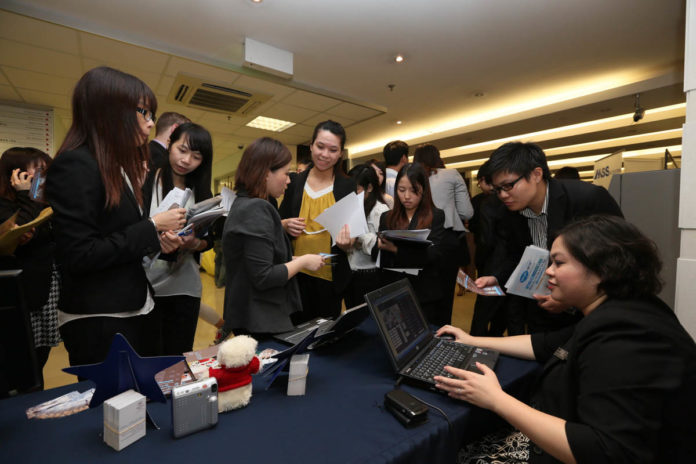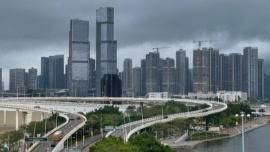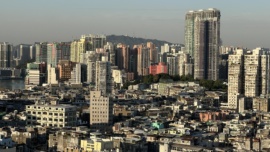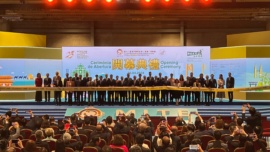There are limited short-term remedies for the current unemployment situation in the city, which has been beset by macroeconomic factors like the Covid-19 pandemic as well as structural change in the local economy
13,300
– No. of unemployed residents as of March 2022
One of the news that has recently caused a storm in the local community is that a local large corporation allegedly intended to only offer MOP8,500 (US$1,062.5) a month to recruit local residents for clerical work, which is much lower than the market price of at least MOP11,000-12,000 a month. This has immediately led to censure from labour groups and many in the society, claiming the offer was “unacceptable” and “unreasonable”.
While this incident has quickly died down, it paints a bleak picture of the current job market in the city, which has been weighed down by the continuation of negative economic impact from the COVID-19 pandemic and the overhaul in the local gaming industry. Observers warn that the local unemployment rate might climb further and that the authorities and the community as a whole should be prepared.
Latest figures from the Statistics and Census Service (DSEC) show the unemployment rate for local residents stood at 4.5 per cent in the first quarter of 2022, the highest since the first quarter of 2009 during the global financial crisis, while the overall jobless rate reached the highest level since the third quarter of 2009 at 3.5 per cent in the first three months of this year. The underemployment rate for residents— the indicator for those working less than 35 hours a week involuntarily— was 3.3 per cent in the January-March period of 2022, improving from 5.1 per cent from the previous quarter but still much higher than below 1 per cent prior to the Covid-19 outbreak.
“There are worries that we are not at the worst times yet in terms of unemployment over the recent negative news about some ‘satellite casinos’, meaning the unemployment rate for residents could rise further from 4.5 per cent ” Henry Chun Kwok Lei, associate head of Department of Finance and Business Economics at University of Macau (UM), says. “Residents who are underemployed now might lose their jobs if the situation exacerbates, and we are at the end of the school year when thousands of university graduates are looking for jobs in this climate — both factors could spike the unemployment rate.”
Latest DSEC data shows the city’s gross domestic product (GDP) slipped 8.9 per cent year-on-year in real terms in the first quarter of 2022, following a rebound of 18 per cent in 2021. The gross gaming revenue, a major indicator of the city’s economic performance, also plunged 36.2 per cent year-on-year to MOP20.45 billion in the first four months of this year, after a recovery of 43.7 per cent last year.
4.5%
– Unemployment rate of residents as of March 2022
Structural unemployment
Besides the weak external demand— as travel restrictions imposed since the start of the COVID-19 pandemic have hampered the local tourism and gaming industry — the UM scholar says the structural change of the local economy, namely, the restructuring in the gaming segment, also plays a key role tot he “severe” unemployment situation now. He highlights the closure of VIP rooms and potential lay-offs in and shutdown of “satellite casinos”, following the arrest of junket bosses and the proposed amendments to local gaming regulations that enhance supervision since the end of last year.
“Structural unemployment is not something that could be resolved over a short time period because it is not linked to the supply and demand in the market,” the UM scholar stresses, for instance, former gaming workers, who have lost their jobs, might not be easy to find a new one that matches their skill sets.
A survey published in late April on the latest employment status of former junket staff reflect what Prof. Lei points out. The poll undertaken by the Integrated Service Centre of the Macau Gaming Industry Employees Home found that 85.1 per cent of them had still not found a job in the wake of the shut down of major local junket brands since late 2021. The poll said the top three reasons cited by the 309 interviewees— with only 23.6 per cent obtaining a bachelor’s degree or higher education qualifications— for their failures in landing a new job were: a scarcity of job openings due to the bad economic climate; a lack of diversity in their work experience; and a lack of vocational skills.
“Structural unemployment is not something that could be resolved over a short time period because it is not linked to the supply and demand in the market,” says Prof Henry Lei of University of Macau

| Unemployed population (000) | |
| 2020 Q1 | 8.5 |
| 2020 Q2 | 10.1 |
| 2020 Q3 | 11.8 |
| 2020 Q4 | 11 |
| 2021 Q1 | 11.6 |
| 2021 Q2 | 11.1 |
| 2021 Q3 | 11.2 |
| 2021 Q4 | 11.9 |
| 2022 Q1 | 13.3 |
Look for new paths
Macau Institute of Management (MIM) President Samuel Tong Kai Chung also highlights the issue of structural unemployment. “The pandemic has greatly affected the economic structure,” he says. “The unemployed [residents] so far have been mainly unskilled staff in the gaming and tourism sector, while professionals and administrative staff have been less affected.”
“As the economic structure of the city will be changed irreversibly, not all these unemployed [residents] could find jobs in the new industries [of Macau], creating the situation of structural unemployment that requires all-round solutions,” he adds. “The government can provide more vocational training for the unemployed to look for opportunities in a new career path, who should also adjust their expectations and be ready to have a different career path with new skill sets.”
Latest figures from DSEC show a total of 13,300 residents were unemployed in the first quarter of 2022, up by 14.7 per cent from a year ago and 11.8 per cent from a year earlier. The tally of unemployed residents was also the highest since the June-August period of 2003, when the gaming industry was just liberalised and the region was still embroiled in the turmoil of the outbreak of SARS (severe acute respiratory syndrome). The top three sectors, in which the greatest number of residents were jobless as of March 2022, included gaming, construction, and retail, the DSEC data indicated.
“As the economic structure of the city will be changed irreversibly, not all these unemployed [residents] could find jobs in the new industries [of Macau], creating the situation of structural unemployment that requires all-round solutions,” says Samuel Tong of Macau Institute of Management

Lack of senior positions
A committee on the administrative affairs of the Legislative Assembly also held a meeting in May to discuss the unemployment situation in the city, in which the lawmakers expressed worries that small-and medium-sized enterprises (SMEs) and companies in other industries might be impacted by the shake-up in the gaming sector, leading to their closure and staff redundancy.
“We have received more enquiries from residents in other sectors besides gaming— such as, retail, hotel and food and beverage— asking for help about employment in recent times,” says lawmaker Leong Sun Iok. “Many of them were not directly sacked by their employers, but they were ‘forced to resign’ due to no-paid leave, deductions in salaries and others.”
Acknowledging the authorities have organised more job fairs and job matching sessions for the unemployed, the legislator from the Macau Federation of Trade Unions, the city’s largest labour group, pinpoints only low-tier job positions wereusually available in these activities, which should also provide more senior positions. “Some residents that have got their new jobs [at the job fairs] told us that they have higher financial pressure for household expenses and home mortgage payment with [a lower] salary level for their new jobs,” he illustrates.
According to the Labour Affairs Bureau (DSAL), the authorities organised19 job matching sessions for various industries, 33 matching sessions with resort and entertainment companies, and one large-scale job fair in the first five months of this year. Since May the bureau has started to host more job matching sessions for various industries, increasing the frequency from three sessions a month to 10 sessions a month, DSAL noted, adding the industries include hotel, retail, security and cleaning. “Together with the regular online and offline employment support service, [the Bureau] has helped 3,084 local residents land a job [so far this year],” DSAL noted in a statement, including the successful employment of 639 residents in the large-scale job fair held in April.
“The authorities should review the imported labour quota in the segments that local residents are interested in and capable of…,” says lawmaker Leong Sun Iok

Not local vs. non-local
“As the number of the unemployed might still rise, the job vacancies sourced by the authorities are not enough,” says the lawmaker from the local labour group. “The authorities should review the imported labour quota in the segments that local residents are interested in and capable of — including gaming, banking and finance, retail, restaurants, facility maintenance and others — to make room for residents…and nurture them to gradually take over the vacancies.”
The number of non-resident workers in the city has already taken a plunge since the start of this unprecedented health crisis. The latest DSAL data show the number of non-resident employees skydived by 14.7 per cent, or about 28,800 fewer, from end-2019 to 167,738 as of March 2022, including a 14 per cent decrease in the number of unskilled non-resident workers to 137,310 and a 19.6 per cent drop in the tally of skilled employees to 5,198. While the tally of non-resident employees has taken a fall in the sectors of gaming, retail, hotel and dining over the same time period, the number has actually gone up in the segments of construction (up by 1 per cent to 29,696), education (up by 5.1 per cent to 3,030) and healthcare (up by 11.5 per cent to 3,004).
Aside from Mr Leong, other lawmakers have also urged the government to review the quota of non-resident labour in companies in light of the grimy prospect. Legislator-cum-businessman Jose Chui Sai Peng has stressed the key is to allow residents to fill in job positions that they “are interested in and capable of”. “If [the government] forced the exit of non-resident labour while [companies] cannot find residents in the market that fit the job, this will only lower the productivity of businesses that might even close down,” he said at a recent meeting of the Legislative Assembly.
He suggested the authorities should better understand the demands and criteria of the unemployed residents, namely their past experiences and interests, and also encourage residents to equip themselves with more skillsets for a new career path. “Non-local residents should only fill up the vacancies that are beyond the interests and capabilities of residents,” he added. “This will facilitate the healthy development [of the equilibrium] between resident and non-resident workers.”
“We hope the government can pave the way for the restart of the Macau economy as soon as possible so that both employers and employees can have more confidence about the future,” says Vong Kok Seng of Macau Chamber of Commerce

Wage subsidy
Prof. Lei of UM also concurs that the issue of the non-local labour force should be considered and regarded “rationally”. “There are not many things the government can do in the short-run to relieve the unemployment situation apart from wage subsidies for employers,” he adds.
The administration unveiled a new scheme of wage subsidy in late May, in which employers are entitled to a total of MOP19,968 per new local staff for six months if they hire a resident between June and August that have been unemployed for at least 60 days. The scheme does not put a cap on the maximum amount of staff and subsidy employers can have, encouraging businesses to hire as many unemployed residents as possible, the government said. Employers applying for this scheme should maintain the existing size of their local workers, should keep the newly-recruited residents for at least 12 months and should not provide no-paid leave to their workers for 12 months. With a budget of nearly MOP300 million, it is expected the scheme could create jobs for as many as 15,000 unemployed residents.
Mr Leong, of the city’s largest labour group, expects this new subsidy could complement other measures the authorities have rolled out in recent months to create better conditions for employers and employees, namely, the third round of electronic consumption benefits scheme that starts in June and the subsidy scheme of water and electricity bills for merchants that starts in July. “All these programmes together could relieve the operational pressure of employers to a certain extent and create conditions for them to hire new staff,” the lawmaker says. “We can only urge employers to try their best to have as many locals as possible.”
‘Give us confidence’
Vong Kok Seng, vice president of the Macau Chamber of Commerce, also acknowledges this new initiative. “This could encourage employers to employ more unemployed residents while they will not sack their existing staff,” he says. “It could help relieve the [financial] cost of employers to a certain extent in recruitment.”
But some cast doubts on whether this can enhance the willingness of businesses in new recruitment given the gloomy economy prospect and the MOP20,000-subsidy only translating to some MOP3,000 a month per staff. “The [new] support measure from the government can address the urgent needs of SMEs but many businesses have reflected that they feel powerless about the future due to the fluctuations of the pandemic, the visa policy of [Mainland China] and the proposed changes to local gaming regulations,” Mr Vong adds.
“We hope the government can pave the way for the restart of the Macau economy as soon as possible so that both employers and employees can have more confidence about the future,” he says.
























